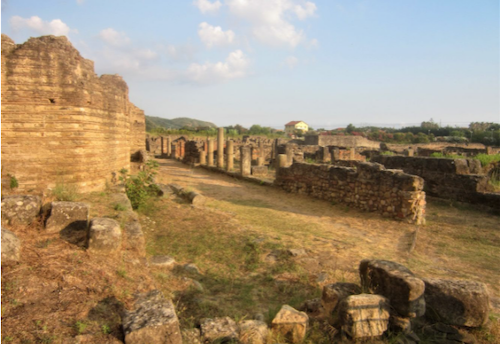Mediterranean History
Pollica and the Cilento region are located in a unique historical and cultural context.
Situated at the border between the Greek colonies of Magna Graecia and the indigenous Etruscan and Lucanian peoples, Pollica and its neighbors have welcomed heroes, thinkers, and explorers.
Center of the Mediterranean Basin, Pollica has always represented the etymology of the Mediterranean, Medium Terrae, meaning sea in the middle of the lands.
In particular, from the remains of two important cities of the classical era, Paestum and Velia, it is still possible to perceive the origins of one of the most famous philosophical schools of ancient Greece.
In this area, Parmenides, an ancient Greek philosopher and founder of ontology, gave birth to his famous poem “On Nature,” which can be considered the first true philosophical text in the history of Western thought concerning the conception of man in his environment.
These places, still vibrating with the thoughts and intuitions of Zeno and Melissus, Parmenides’s students, tell of the attachment to Nature, the will to feel in harmony, the desire to know, to discover, and to get involved.
Paestum & Velia

The legacy of the Archaeological Park of Paestum and Velia is a precious testimony of this.
From being the cradle of Greek philosophy, the territory has experienced a succession of events that have increased its resilience and punctuated the history of the Mediterranean lifestyle. In fact, Velia (or Elea, as it used to be called before the Romans came) has always been a symbol of and punctuated the history of the Mediterranean lifestyle. In fact, Velia (or Elea, as it used to be called before the Romans came) has always been a symbol of throughout history.
throughout history. Salerno Medical School in the early Middle Ages, which paved the way for modern Western medicine and hosted the first known female doctor, Turola de Ruggero.
And finally the “invention” of the Mediterranean Diet, in the Latin sense of the word invenire, which means discover, recognize, find. It is the result of a foreign gaze, that of Ancel and Margaret Keys, who recognized a coherent, healthy and resilient system of life and nutrition, capable of crossing historical eras and cultural intersections to arrive at the present day.
It is for this reason and given the full embracement of the knowledge and tradition of the Mediterranean Diet, that today the Centro Studi Dieta Mediterranea “Angelo Vassallo” of the Municipality of Pollica and Future Food Institute have organized, in Pollica, a day of meetings to celebrate the eleventh anniversary of the recognition of the Mediterranean Diet as UNESCO Intangible Cultural Heritage of Humanity.
11th Anniversary of UNESCO Nomination of Mediterranean Diet
The event kicks off a week of activities, resulting in the VI Week of Italian Cuisine in the World coordinated by the Directorate-General for the Promotion of the Country System of the Italian Ministry of Foreign Affairs, fully aligned with the theme proposed for 2021: “Tradition and Perspectives of Italian Cuisine: Awareness and Enhancement of Food Sustainability.”

On this occasion, hosts, policymakers, professors, experts have been physically guided through the places that have made the Mediterranean Diet available to us: the Archaeological Parc of Paestum and Velia, and also the two main museums in the area: The Living Museum of the Mediterranean Diet in Pioppi (Pollica), dedicated to the food model and lifestyle recognized by UNESCO in 2010 and The Virtual Museum of the Mediterranean Diet, which collects the stories and testimonials of the Mediterranean Diet.
These are the places that have allowed us to experience, even today, the crossroads of knowledge and revolutionary intuitions that, over the centuries, have composed this immense historical, cultural, philosophical, and landscape heritage.

